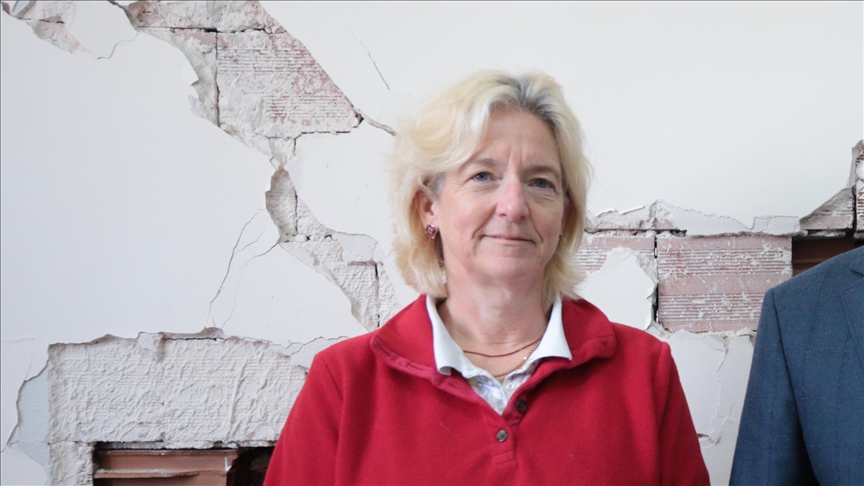

By Anadolu Agency
LONDON
The entire recovery process in Türkiye’s earthquake-hit southern region should be sustainable, from the removal of the debris and its recycling to supporting the reopening of small businesses, officials told Anadolu.
The twin strong earthquakes that hit Türkiye on Feb. 6 claimed the lives of more than 46,100 people. They affected around 13.5 million people across 11 provinces: Hatay, Gaziantep, Adiyaman, Malatya, Adana, Diyarbakir, Kahramanmaras, Kilis, Osmaniye, Sanliurfa and Elazig.
“This disaster has generated an unprecedented rate of rubble. It is because it was an urban earthquake that it hit such a big territory with such destructive force. It is 100 million cubic meters of rubble, which is just a huge volume,” Louisa Vinton, Türkiye resident representative of the United Nations Development Program (UNDP), told Anadolu.
“It is not just rubble, there are people’s homes, their lives, dreams and memories.”
Vinton warned, however, that the rubble should not be dumped somewhere quickly in an effort to get rid of it. This should be one of the lessons from the 1999 earthquake.
“If the rubble is dumped in sensitive nature areas or where there is vital water supply, it is much more costly and harder later to clean up the area. So our argument is that it needs to be taken from the very beginning that much of the material in this debris can be recycled. If proper care is taken, it can be ground up, separated and reused,” she said.
“This is very important because decisions that are made now will affect people’s lives for decades to come.”
Call on international community to support recovery
Vinton also noted that the recovery is important to provide a sense of normality, by helping people and small businesses start up again either through small grants or necessary equipment.
“Our message to the international community is it needs to be understood just how unprecedented the scale of this disaster is. The displacement is huge. So as UN Secretary-General Antonio Guterres has said, Türkiye has been generous for a decade in accommodating and housing and hosting in a very generous way,” she said.
Vinton called on the international community, saying now is the time to show the same generosity to Türkiye, to provide funding to help not just in physical reconstruction but even more importantly in the restoration of normal life, so people can live in the community.
She said according to the International Labor Organization’s early estimates, 150,000 small retail shops and businesses had been devastated due to the earthquakes.
Vinton said there are a lot of people and families depending on one retail establishment, so it is vital for small businesses not to shut down completely, supported by different practices from micro lending to small-scale financing.
“It is the question of having enough money at a very flexible condition, simplifying, localizing and turning on that tap of funding as soon as possible,” she said, noting that while recovering, no one should be left behind, especially women.
“Women-headed households or women entrepreneurs who are at the very back of the line for any kind of assistance should be ensured in extending these financial nets. Thus, it is a moment that cries out for international solidarity. The government is in the lead in recovery efforts, but the unprecedented scope and scale calls for unprecedented generosity from the international community,” she added.
“There should really be a stimulus to generosity by the international community.”
‘Recovery of small businesses should be a priority’
Sibel Kulaksiz, a senior economist at the World Bank, warned that the recovery could be costly, but there are different financial mechanisms to support a sustainable recovery.
She recalled the recovery package provided by the World Bank to the quake-hit region.
The World Bank recently announced $1.78 billion in assistance to help Türkiye’s relief and recovery efforts. Immediate assistance of $780 million is offered via Contingent Emergency Response Components (CERCs) from two existing projects in Türkiye – the Türkiye Earthquake, Floods and Wildfires Emergency Reconstruction Project (TEFWER) and the Climate and Disaster Resilient Cities Project.
The assistance will be used for rebuilding basic infrastructure at the municipal level, the World Bank said, while an additional $1 billion is also being prepared to support people affected.
Kulaksiz also pointed to the importance of the recovery of small businesses, as most of these businesses need to start almost from scratch.
“This should be one of the priority issues of the recovery process. The most effective internationally accepted fiscal policy is to provide direct cash support to small businesses and households affected by the earthquake. This can be done through financial transfers from the general budget,” she said.
We use cookies on our website to give you a better experience, improve performance, and for analytics. For more information, please see our Cookie Policy By clicking “Accept” you agree to our use of cookies.
Read More